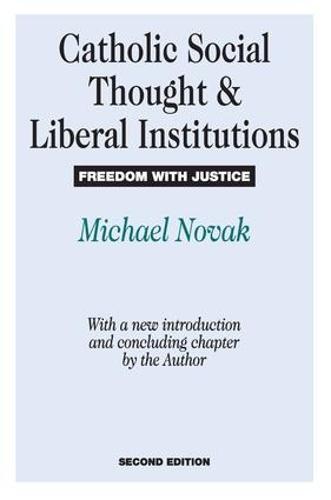Overview
Increasingly, the religious leaders of the world are addressing problems of political economy, expressing concern about the poor. But will their efforts actually help the poor? Or harm them? Much depends, Michael Novak asserts, upon what kind of institutions are constructed, that is, upon realism and practicality. His thesis may be simply stated: Although the Catholic Church during the nineteenth and early twentieth centuries set itself against liberalism as an ideology, it has slowly come to admire liberal institutions such as democracy and free markets. Between the Catholic vision of social justice and liberal institutions, Novak argues, there is a profound consonance (but not identity). Both celebrate realism, respect for institutions, and prudence or practical wisdom. The Catholic tradition adds to liberal individualism a strong communitarian sense. This book was first published in 1984 as Freedom with Justice. This new edition adds both a lengthy introduction carrying forward the original argument and a long concluding chapter on Pope John Paul IPs controversial new encyclical of early 1988, Sollicitudo Rei Socialis.
Full Product Details
Author: Mario Bunge ,
Michael Novak
Publisher: Taylor & Francis Inc
Imprint: Transaction Publishers
Edition: 2nd edition
Dimensions:
Width: 15.20cm
, Height: 1.60cm
, Length: 22.90cm
Weight: 0.430kg
ISBN: 9780887387630
ISBN 10: 0887387632
Pages: 311
Publication Date: 30 January 1988
Audience:
College/higher education
,
Professional and scholarly
,
Undergraduate
,
Postgraduate, Research & Scholarly
Format: Paperback
Publisher's Status: Active
Availability: Manufactured on demand

We will order this item for you from a manufactured on demand supplier.
Reviews
An important contribution to our critical understanding of the possibilities for dialogue and mutual influence between Catholic social thought and Anglo-American liberalism. </p> --John Langan, S.J., <em>Journal of American Academy of </em><em>Religion</em></p> He rightly chides theologians for being so often absorbed in moral questions regarding just distribution that they fail to attend to the positive moral impact of the productivity of capitalism in the creating of goods, new wealth, and jobs. </p> --William French, <em>Journal of Religion</em></p> Novak is to be commended for raising the question of liberty in connection with economic justice. . . . This volume makes a significant contribution to the discussion of Catholic social thought and contemporary economic policies. </p> --John T. Pawlikowski, O.S.M., <em>Theology Today</em></p>
-An important contribution to our critical understanding of the possibilities for dialogue and mutual influence between Catholic social thought and Anglo-American liberalism.- --John Langan, S.J., Journal of American Academy of Religion -He rightly chides theologians for being so often absorbed in moral questions regarding just distribution that they fail to attend to the positive moral impact of the productivity of capitalism in the creating of goods, new wealth, and jobs.- --William French, Journal of Religion -Novak is to be commended for raising the question of liberty in connection with economic justice. . . . This volume makes a significant contribution to the discussion of Catholic social thought and contemporary economic policies.- --John T. Pawlikowski, O.S.M., Theology Today An important contribution to our critical understanding of the possibilities for dialogue and mutual influence between Catholic social thought and Anglo-American liberalism. --John Langan, S.J., Journal of American Academy of Religion He rightly chides theologians for being so often absorbed in moral questions regarding just distribution that they fail to attend to the positive moral impact of the productivity of capitalism in the creating of goods, new wealth, and jobs. --William French, Journal of Religion Novak is to be commended for raising the question of liberty in connection with economic justice. . . . This volume makes a significant contribution to the discussion of Catholic social thought and contemporary economic policies. --John T. Pawlikowski, O.S.M., Theology Today An important contribution to our critical understanding of the possibilities for dialogue and mutual influence between Catholic social thought and Anglo-American liberalism. --John Langan, S.J., Journal of American Academy of Religion He rightly chides theologians for being so often absorbed in moral questions regarding just distribution that they fail to attend to the positive moral impact of the productivity of capitalism in the creating of goods, new wealth, and jobs. --William French, Journal of Religion Novak is to be commended for raising the question of liberty in connection with economic justice. . . . This volume makes a significant contribution to the discussion of Catholic social thought and contemporary economic policies. --John T. Pawlikowski, O.S.M., Theology Today Novak is to be commended for raising the question of liberty in connection with economic justice. This volume makes a significant contribution to the discussion of Catholic social thought and contemporary economic policies. --John T. Pawlikowski, O.S.M, Theology Today
Novak is to be commended for raising the question of liberty in connection with economic justice. This volume makes a significant contribution to the discussion of Catholic social thought and contemporary economic policies. --John T. Pawlikowski, O.S.M, Theology Today
An important contribution to our critical understanding of the possibilities for dialogue and mutual influence between Catholic social thought and Anglo-American liberalism. --John Langan, S.J., Journal of American Academy of Religion He rightly chides theologians for being so often absorbed in moral questions regarding just distribution that they fail to attend to the positive moral impact of the productivity of capitalism in the creating of goods, new wealth, and jobs. --William French, Journal of Religion Novak is to be commended for raising the question of liberty in connection with economic justice. . . . This volume makes a significant contribution to the discussion of Catholic social thought and contemporary economic policies. --John T. Pawlikowski, O.S.M., Theology Today



